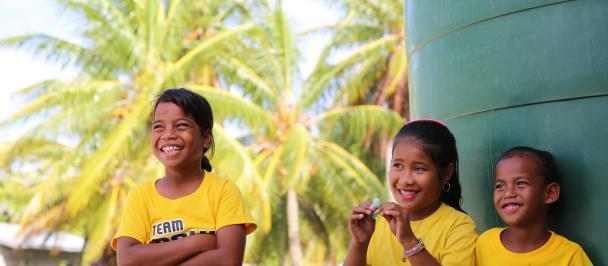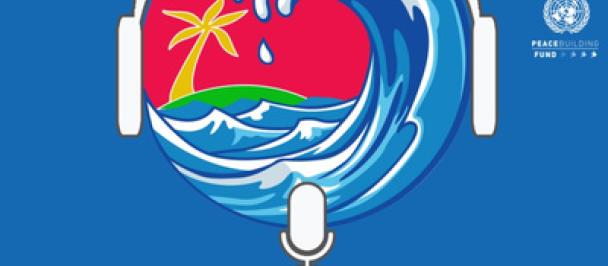Raising awareness on risk-informed development through "maroro/talanoa" in Kiribati
December 7, 2022

The two-day maroro/talanoa on risk-informed development was held on the 27 and 29 October focused on working with the Ministry of Internal Affairs to identify their challenges in risk-informing their work.
Tarawa, Kiribati - "When we talk about risks in Kiribati, our context is critical. We know our risks well, but in risk-informing projects, we know that we are always going to be making adjustments to minimize risks – our risks are so extreme that we are never going to be able to eliminate risks entirely, particularly climate risks."
This is a statement made by Kiribati Ministry of Internal Affairs (MIA) Senior Assistant Secretary, Mr Kaotitaake Kokoria. The Ministry plays a critical role in supporting local government and island communities to address their development priorities by working with leaders and communities to identify their needs. MIA facilitates the development of Government and externally funded interventions and projects that can help to address these needs.
Mr. Kokoria added, "As part of this process, we are always conscious of the climate risks that we need to take into consideration that will affect project success, but we don't currently have systematic tools that help with risk screening beyond the use of the standard problem tree analysis."
In sharing examples from Fiji, a planner within the Ministry of Rural and Maritime Development and Disaster Management (MRMDDM) summarized the advantages of risk-informing development (RID) projects "Do it once, do it well". These words resonated with the Ministry of Internal Affairs (MIA) Director of Local Government, Mr. Teewa Tonaeka.
"There are definitely ways that we can strengthen the ways we risk-inform projects in our communities. Investment in risk screening and consideration at the start of the project design and implementation will ultimately lead to the project's sustainability," said Mr. Tonaeka.
The two-day maroro/talanoa on RID held on the 27 and 29 October focused on working with the Ministry of Internal Affairs to identify their challenges in risk-informing their work. Examples from the UN Development Programme’s Governance for Resilient Development in the Pacific (Gov4Res) Project partners in Fiji, Tonga, and Vanuatu highlighted the difference RID has on the ground.
Ten participants, from which three women, discussed what makes a community in Kiribati resilient by drawing a community and identifying all of the factors that can strengthen community resilience, such as stronger and appropriately designed infrastructure and nature-based coastal protection measures, such as planting mangroves. Supporting peer-to-peer learning and sharing examples from other partner countries' work to strengthen their governance systems to incorporate risk opened the talanoa space for the MIA Senior Officials to share practical suggestions of how to strengthen RID within MIA processes.
Using the risk governance building blocks - people, mechanisms, and processes – participants discussed their application by examining MIA's current practices. This included conversations about the critical role of leadership in RID, and the importance of reforming planning and budget processes. A power walk activity helped participants understand the important way that risks intersect and how fundamental social and cultural status, access to resources, information and education, power, and privilege are to ensuring that development is inclusive and can deliver benefits for marginalized individuals and communities.
MIA Deputy Secretary for Corporate Services, Ms. Tebantaake Keariki reflected at the end of the two-day talanoa. She said, "Gov4Res is not the first project to talk about risks, but the approach is new to us and refreshing. Starting from where we are currently and working with us to identify how our current systems and processes can be strengthened.
“When we look at practical examples from other countries and the impacts of RID, we are confident we can do it. We know our risks better than anyone and the steps to be taken to include RID in our plans and budget can be done. But there will be challenges ahead as we change how we do our work. So we need strong support from our leaders," added Ms. Keariki.
Director for Local Government Tonaeka shared his thoughts on RID and decision-makers saying, "The question is how can we integrate risk-informed development in the decision-making process in particular for those at the higher level so that decisions can be RID influenced and improved to address the need of the people in the grassroots?"
Key priorities for the next steps identified by MIA included capacity building to learn more about RID practices and tools. A work plan will be co-designed by MIA and Gov4Res to support actions to strengthen MIA's systems for RID and pilot these tools through practical project design and implementation.
The Gov4Res Project is working together with Pacific Island governments to ensure that countries adapt their decision making and governance systems towards more risk-informed development. The Project, implemented by the UNDP Pacific Office in Fiji is partnering with a range of partners including the Australian Department of Foreign Affairs and Trade, the Korea International Cooperation Agency, the New Zealand’s Ministry of Foreign Affairs and Trade and the Swedish International Development Cooperation Agency.

 Locations
Locations

